- Home
- Edith Wharton
Ethan Frome, Summer, Bunner Sisters Page 10
Ethan Frome, Summer, Bunner Sisters Read online
Page 10
‘This is the night we were to have gone coasting, Matt,’ he said at length, with the rich sense, as he spoke, that they could go on any other night they chose, since they had all time before them.
She smiled back at him. ‘I guess you forgot!’
‘No, I didn’t forget; but it’s as dark as Egypt outdoors. We might go to-morrow if there’s a moon.’
She laughed with pleasure, her head tilted back, the lamplight sparkling on her lips and teeth. ‘That would be lovely, Ethan!’
He kept his eyes fixed on her, marvelling at the way her face changed with each turn of their talk, like a wheat-field under a summer breeze. It was intoxicating to find such magic in his clumsy words, and he longed to try new ways of using it.
‘Would you be scared to go down the Corbury road with me on a night like this?’ he asked.
Her cheeks burned redder. ‘I ain’t any more scared than you are!’
‘Well, I’d be scared, then; I wouldn’t do it. That’s an ugly corner down by the big elm. If a fellow didn’t keep his eyes open he’d go plumb into it.’ He luxuriated in the sense of protection and authority which his words conveyed. To prolong and intensify the feeling he added: ‘I guess we’re well enough here.’
She let her lids sink slowly, in the way he loved. ‘Yes, we’re well enough here,’ she sighed.
Her tone was so sweet that he took the pipe from his mouth and drew his chair up to the table. Leaning forward, he touched the farther end of the strip of brown stuff that she was hemming. ‘Say, Matt,’ he began with a smile, ‘what do you think I saw under the Varnum spruces, coming along home just now? I saw a friend of yours getting kissed.’
The words had been on his tongue all the evening, but now that he had spoken them they struck him as inexpressibly vulgar and out of place.
Mattie blushed to the roots of her hair and pulled her needle rapidly twice or thrice through her work, insensibly drawing the end of it away from him. ‘I suppose it was Ruth and Ned,’ she said in a low voice, as though he had suddenly touched on something grave.
Ethan had imagined that his allusion might open the way to the accepted pleasantries, and these perhaps in turn to a harmless caress, if only a mere touch on her hand. But now he felt as if her blush had set a flaming guard about her. He supposed it was his natural awkwardness that made him feel so. He knew that most young men made nothing at all of giving a pretty girl a kiss, and he remembered that the night before, when he had put his arm about Mattie, she had not resisted. But that had been out-of-doors, under the open irresponsible night. Now, in the warm lamplit room, with all its ancient implications of conformity and order, she seemed infinitely farther away from him and more unapproachable.
To ease his constraint he said: ‘I suppose they’ll be setting a date before long.’
‘Yes. I shouldn’t wonder if they got married some time along in the summer.’ She pronounced the word married as if her voice caressed it. It seemed a rustling covert leading to enchanted glades. A pang shot through Ethan, and he said, twisting away from her in his chair: ‘It’ll be your turn next, I wouldn’t wonder.’
She laughed a little uncertainly. ‘Why do you keep on saying that?’
He echoed her laugh. ‘I guess I do it to get used to the idea.’
He drew up to the table again and she sewed on in silence, with dropped lashes, while he sat in fascinated contemplation of the way in which her hands went up and down above the strip of stuff, just as he had seen a pair of birds make short perpendicular flights over a nest they were building. At length, without turning her head or lifting her lids, she said in a low tone: ‘It’s not because you think Zeena’s got anything against me, is it?’
His former dread started up full-armed at the suggestion. ‘Why, what do you mean?’ he stammered.
She raised distressed eyes to his, her work dropping on the table between them. ‘I don’t know. I thought last night she seemed to have.’
‘I’d like to know what,’ he growled.
‘Nobody can tell with Zeena.’ It was the first time they had ever spoken so openly of her attitude toward Mattie, and the repetition of the name seemed to carry it to the farther corners of the room and send it back to them in long repercussions of sound. Mattie waited, as if to give the echo time to drop, and then went on: ‘She hasn’t said anything to you?’
He shook his head. ‘No, not a word.’
She tossed the hair back from her forehead with a laugh. ‘I guess I’m just nervous, then. I’m not going to think about it any more.’
‘Oh, no – don’t let’s think about it, Matt!’
The sudden heat of his tone made her colour mount again, not with a rush, but gradually, delicately, like the reflection of a thought stealing slowly across her heart. She sat silent, her hands clasped on her work, and it seemed to him that a warm current flowed toward him along the strip of stuff that still lay unrolled between them. Cautiously he slid his hand palm-downward along the table till his finger-tips touched the end of the stuff. A faint vibration of her lashes seemed to show that she was aware of his gesture, and that it had sent a counter-current back to her; and she let her hands lie motionless on the other end of the strip.
As they sat thus he heard a sound behind him and turned his head. The cat had jumped from Zeena’s chair to dart at a mouse in the wainscot, and as a result of the sudden movement the empty chair had set up a spectral rocking.
‘She’ll be rocking in it herself this time to-morrow,’ Ethan thought. ‘I’ve been in a dream, and this is the only evening we’ll ever have together.’ The return to reality was as painful as the return to consciousness after taking an anæsthetic. His body and brain ached with indescribable weariness, and he could think of nothing to say or to do that should arrest the mad flight of the moments.
His alteration of mood seemed to have communicated itself to Mattie. She looked up at him languidly, as though her lids were weighted with sleep and it cost her an effort to raise them. Her glance fell on his hand, which now completely covered the end of her work and grasped it as if it were a part of herself. He saw a scarcely perceptible tremor cross her face, and without knowing what he did he stooped his head and kissed the bit of stuff in his hold. As his lips rested on it he felt it glide slowly from beneath them, and saw that Mattie had risen and was silently rolling up her work. She fastened it with a pin, and then, finding her thimble and scissors, put them with the roll of stuff into the box covered with fancy paper which he had once brought to her from Bettsbridge.
He stood up also, looking vaguely about the room. The clock above the dresser struck eleven.
‘Is the fire all right?’ she asked in a low voice.
He opened the door of the stove and poked aimlessly at the embers. When he raised himself again he saw that she was dragging toward the stove the old soap-box lined with carpet in which the cat made its bed. Then she recrossed the floor and lifted two of the geranium pots in her arms, moving them away from the cold window. He followed her and brought the other geraniums, the hyacinth bulbs in a cracked custard bowl and the German ivy trained over an old croquet hoop.
When these nightly duties were performed there was nothing left to do but to bring in the tin candlestick from the passage, light the candle and blow out the lamp. Ethan put the candlestick in Mattie’s hand and she went out of the kitchen ahead of him, the light that she carried before her making her dark hair look like a drift of mist on the moon.
‘Good night, Matt,’ he said as she put her foot on the first step of the stairs.
She turned and looked at him a moment. ‘Good night, Ethan,’ she answered, and went up.
When the door of her room had closed on her he remembered that he had not even touched her hand.
VI
The next morning at breakfast Jotham Powell was between them, and Ethan tried to hide his joy under an air of exaggerated indifference, lounging back in his chair to throw scraps to the cat, growling at the weather, and not so much as offe
ring to help Mattie when she rose to clear away the dishes.
He did not know why he was so irrationally happy, for nothing was changed in his life or hers. He had not even touched the tip of her fingers or looked her full in the eyes. But their evening together had given him a vision of what life at her side might be, and he was glad now that he had done nothing to trouble the sweetness of the picture. He had a fancy that she knew what had restrained him …
There was a last load of lumber to be hauled to the village, and Jotham Powell – who did not work regularly for Ethan in winter – had ‘come round’ to help with the job. But a wet snow, melting to sleet, had fallen in the night and turned the roads to glass. There was more wet in the air and it seemed likely to both men that the weather would ‘milden’ toward afternoon and make the going safer. Ethan therefore proposed to his assistant that they should load the sledge at the wood-lot, as they had done on the previous morning, and put off the ‘teaming’ to Starkfield till later in the day. This plan had the advantage of enabling him to send Jotham to the Flats after dinner to meet Zenobia, while he himself took the lumber down to the village.
He told Jotham to go out and harness up the greys, and for a moment he and Mattie had the kitchen to themselves. She had plunged the breakfast dishes into a tin dish-pan and was bending above it with her slim arms bared to the elbow, the steam from the hot water beading her forehead and tightening her rough hair into little brown rings like the tendrils on the traveller’s joy.
Ethan stood looking at her, his heart in his throat. He wanted to say: ‘We shall never be alone again like this.’ Instead, he reached down his tobacco-pouch from a shelf of the dresser, put it into his pocket and said: ‘I guess I can make out to be home for dinner.’
She answered ‘All right, Ethan,’ and he heard her singing over the dishes as he went.
As soon as the sledge was loaded he meant to send Jotham back to the farm and hurry on foot into the village to buy the glue for the pickle-dish. With ordinary luck he should have had time to carry out this plan; but everything went wrong from the start. On the way over to the wood-lot one of the greys slipped on a glare of ice and cut his knee; and when they got him up again Jotham had to go back to the barn for a strip of rag to bind the cut. Then, when the loading finally began, a sleety rain was coming down once more, and the tree trunks were so slippery that it took twice as long as usual to lift them and get them in place on the sledge. It was what Jotham called a sour morning for work, and the horses, shivering and stamping under their wet blankets, seemed to like it as little as the men. It was long past the dinner-hour when the job was done, and Ethan had to give up going to the village because he wanted to lead the injured horse home and wash the cut himself.
He thought that by starting out again with the lumber as soon as he had finished his dinner he might get back to the farm with the glue before Jotham and the old sorrel had had time to fetch Zenobia from the Flats; but he knew the chance was a slight one. It turned on the state of the roads and on the possible lateness of the Bettsbridge train. He remembered afterward, with a grim flash of self-derision, what importance he had attached to the weighing of these probabilities …
As soon as dinner was over he set out again for the wood-lot, not daring to linger till Jotham Powell left. The hired man was still drying his wet feet at the stove, and Ethan could only give Mattie a quick look as he said beneath his breath: ‘I’ll be back early.’
He fancied that she nodded her comprehension; and with that scant solace he had to trudge off through the rain.
He had driven his load half-way to the village when Jotham Powell overtook him, urging the reluctant sorrel toward the Flats. ‘I’ll have to hurry up to do it,’ Ethan mused, as the sleigh dropped down ahead of him over the dip of the school-house hill. He worked like ten at the unloading, and when it was over hastened on to Michael Eady’s for the glue. Eady and his assistant were both ‘down street’, and young Denis, who seldom deigned to take their place, was lounging by the stove with a knot of the golden youth of Starkfield. They hailed Ethan with ironic compliment and offers of conviviality; but no one knew where to find the glue. Ethan, consumed with the longing for a last moment alone with Mattie, hung about impatiently while Denis made an ineffectual search in the obscurer corners of the store.
‘Looks as if we were all sold out. But if you’ll wait around till the old man comes along maybe he can put his hand on it.’
‘I’m obliged to you, but I’ll try if I can get it down at Mrs Homan’s,’ Ethan answered, burning to be gone.
Denis’s commercial instinct compelled him to aver on oath that what Eady’s store could nor produce would never be found at the widow Homan’s; but Ethan, heedless of this boast, had already climbed to the sledge and was driving on to the rival establishment. Here, after considerable search, and sympathetic questions as to what he wanted it for, and whether ordinary flour paste wouldn’t do as well if she couldn’t find it, the widow Homan finally hunted down her solitary bottle of glue to its hiding-place in a medley of cough-lozenges and corset-laces.
‘I hope Zeena ain’t broken anything she sets store by,’ she called after him as he turned the greys toward home.
The fitful bursts of sleet had changed into a steady rain and the horses had heavy work even without a load behind them. Once or twice, hearing sleigh-bells, Ethan turned his head, fancying that Zeena and Jotham might overtake him; but the old sorrel was not in sight, and he set his face against the rain and urged on his ponderous pair.
The barn was empty when the horses turned into it and, after giving them the most perfunctory ministrations they had ever received from him, he strode up to the house and pushed open the kitchen door.
Mattie was there alone, as he had pictured her. She was bending over a pan on the stove; but at the sound of his step she turned with a start and sprang to him.
‘See, here, Matt, I’ve got some stuff to mend the dish with! Let me get at it quick,’ he cried, waving the bottle in one hand while he put her lightly aside; but she did not seem to hear him.
‘Oh, Ethan – Zeena’s come,’ she said in a whisper, clutching his sleeve.
They stood and stared at each other, pale as culprits.
‘But the sorrel’s not in the barn!’ Ethan stammered.
‘Jotham Powell brought some goods over from the Flats for his wife, and he drove right on home with them,’ she explained.
He gazed blankly about the kitchen, which looked cold and squalid in the rainy winter twilight.
‘How is she?’ he asked, dropping his voice to Mattie’s whisper.
She looked away from him uncertainly. ‘I don’t know. She went right up to her room.’
‘She didn’t say anything?’
‘No.’
Ethan let out his doubts in a low whistle and thrust the bottle back into his pocket. ‘Don’t fret; I’ll come down and mend it in the night,’ he said. He pulled on his wet coat again and went back to the barn to feed the greys.
While he was there Jotham Powell drove up with the sleigh, and when the horses had been attended to Ethan said to him: ‘You might as well come back up for a bite.’ He was not sorry to assure himself of Jotham’s neutralizing presence at the supper table, for Zeena was always ‘nervous’ after a journey. But the hired man, though seldom loth to accept a meal not included in his wages, opened his stiff jaws to answer slowly: ‘I’m obliged to you, but I guess I’ll go along back.’
Ethan looked at him in surprise. ‘Better come up and dry off. Looks as if there’d be something hot for supper.’
Jotham’s facial muscles were unmoved by this appeal and, his vocabulary being limited, he merely repeated: ‘I guess I’ll go along back.’
To Ethan there was something vaguely ominous in this stolid rejection of free food and warmth, and he wondered what had happened on the drive to nerve Jotham to such stoicism. Perhaps Zeena had failed to see the new doctor or had not liked his counsels: Ethan knew that in such cases the first pers
on she met was likely to be held responsible for her grievance.
When he re-entered the kitchen the lamp lit up the same scene of shining comfort as on the previous evening. The table had been as carefully laid, a clear fire glowed in the stove, the cat dozed in its warmth, and Mattie came forward carrying a plate of dough-nuts.
She and Ethan looked at each other in silence; then she said, as she had said the night before: ‘I guess it’s about time for supper.’
VII
Ethan went out into the passage to hang up his wet garments. He listened for Zeena’s step and, not hearing it, called her name up the stairs. She did not answer, and after a moment’s hesitation he went up and opened her door. The room was almost dark, but in the obscurity he saw her sitting by the window, bolt upright, and knew by the rigidity of the outline projected against the pane that she had not taken off her travelling dress.
‘Well, Zeena,’ he ventured from the threshold.
She did not move, and he continued: ‘Supper’s about ready. Ain’t you coming?’
She replied: ‘I don’t feel as if I could touch a morsel.’ It was the consecrated formula, and he expected it to be followed, as usual, by her rising and going down to supper. But she remained seated, and he could think of nothing more felicitous than: ‘I presume you’re tired after the long ride.’
Turning her head at this, she answered solemnly: ‘I’m a great deal sicker than you think.’
Her words fell on his ear with a strange shock of wonder. He had often heard her pronounce them before – what if at last they were true?
He advanced a step or two into the dim room. ‘I hope that’s not so, Zeena,’ he said.
She continued to gaze at him through the twilight with a mien of wan authority, as of one consciously singled out for a great fate. ‘I’ve got complications,’ she said.
Ethan knew the word for one of exceptional import. Almost everybody in the neighbourhood had ‘troubles’, frankly localized and specified; but only the chosen had ‘complications’. To have them was in itself a distinction, though it was also, in most cases, a death-warrant. People struggled on for years with ‘troubles’, but they almost always succumbed to ‘complications’.

 The Age of Innocence
The Age of Innocence The Reef
The Reef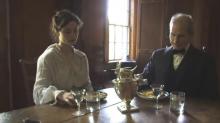 Summer
Summer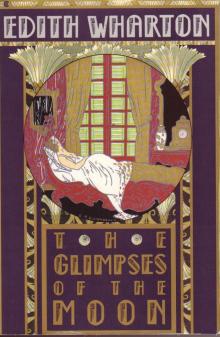 The Glimpses of the Moon
The Glimpses of the Moon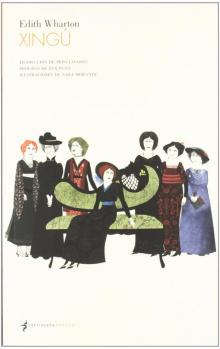 Xingu
Xingu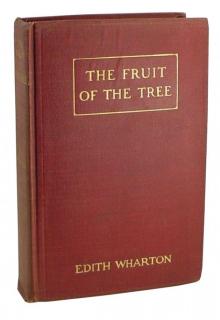 The Fruit of the Tree
The Fruit of the Tree Fast and Loose
Fast and Loose Artemis to Actaeon and Other Verse
Artemis to Actaeon and Other Verse The Line of Least Resistance
The Line of Least Resistance The Lamp of Psyche
The Lamp of Psyche The Reckoning
The Reckoning Afterward
Afterward The New York Stories of Edith Wharton
The New York Stories of Edith Wharton The 2014 Halloween Horrors Megapack
The 2014 Halloween Horrors Megapack 'Copy': A Dialogue
'Copy': A Dialogue The Recovery
The Recovery The Fulness of Life
The Fulness of Life Early Short Stories Vol. 1
Early Short Stories Vol. 1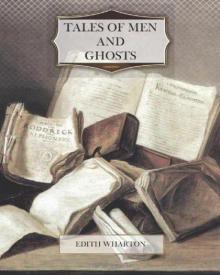 Tales of Men and Ghosts
Tales of Men and Ghosts The House of the Dead Hand
The House of the Dead Hand That Good May Come
That Good May Come The Buccaneers
The Buccaneers Other Times, Other Manners
Other Times, Other Manners The Hermit and the Wild Woman
The Hermit and the Wild Woman Kerfol
Kerfol The Duchess at Prayer
The Duchess at Prayer Bunner Sisters
Bunner Sisters The Choice
The Choice Madame De Treymes
Madame De Treymes Ethan Frome, Summer, Bunner Sisters
Ethan Frome, Summer, Bunner Sisters In Morocco
In Morocco The Valley of Decision
The Valley of Decision Age of Innocence (Barnes & Noble Classics Series)
Age of Innocence (Barnes & Noble Classics Series) The Angel at the Grave
The Angel at the Grave April Showers
April Showers Sanctuary
Sanctuary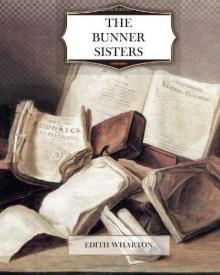 The Bunner Sisters
The Bunner Sisters Mrs. Manstey's View
Mrs. Manstey's View Writing a War Story
Writing a War Story The Custom of the Country
The Custom of the Country In Trust
In Trust The Triumph of the Night
The Triumph of the Night The Hermit and the Wild Woman, and Other Stories
The Hermit and the Wild Woman, and Other Stories Roman Fever and Other Stories
Roman Fever and Other Stories The Mission of Jane
The Mission of Jane The Descent of Man and Other Stories
The Descent of Man and Other Stories Coming Home
Coming Home The Touchstone
The Touchstone Early Short Stories Vol. 2
Early Short Stories Vol. 2 Edith Wharton's Verse, 1879-1919, from various journals.
Edith Wharton's Verse, 1879-1919, from various journals.